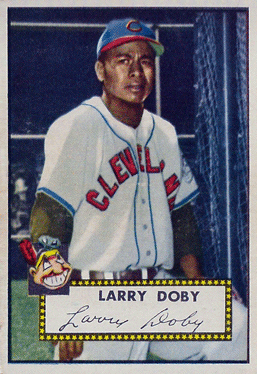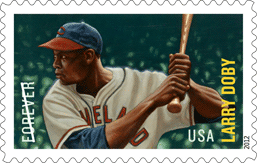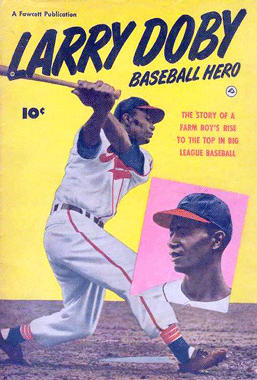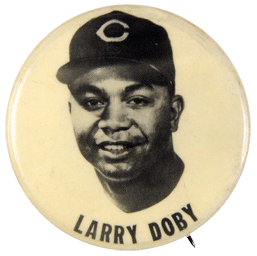 By Mike May By Mike May
In recent years on April 15th, the world of Major League Baseball has been honoring the anniversary of Jackie Robinson's debut with the Brooklyn Dodgers by having every player on every major league team wear Robinson's number (42) that day. Less than three months after Robinson broke baseball's color barrier in 1947, fellow African-American Larry Doby made baseball history himself by becoming the first black to play in the American League.
On July 3, 1947, Cleveland Indians owner Bill Veeck signed Doby to a contract and two days later, Doby played in his first game for the Indians. In that opening game, he appeared as a pinch hitter vs. the Chicago White Sox, on the road at Comiskey Park. In that inaugural at-bat, Doby struck out on three pitches.
After Robinson and Doby started their Major League Baseball careers in 1947, the next three blacks in the big leagues were Henry Thompson (St. Louis Browns), Willard Brown (St. Louis Browns), and Dan Bankhead (Brooklyn Dodgers).
Early Days
While a page in the history books of Cleveland sports will always be dedicated to Doby and his accomplishments on the baseball diamond, life was not always a 'bowl of cherries' for the former member of the Tribe.
He was born during a very difficult era – 1924 in Camden, South Carolina. Of course, racial discrimination was a way of life at the time, especially in Dixie where he lived until he turned 14. As a youngster, Doby never envisioned a career as a professional athlete, especially in baseball's big leagues, even though his summers were totally dedicated to America's pastime.
"As Negro kids, we didn't have days for water skiing and days for beach parties, and outings and piano lesions," said Doby. "We had baseball, morning until night."
Was he bitter at the lack of opportunity for young blacks who wanted to make a living in professional baseball? Doby was quick to shake his head 'no.'
"I don't think any African-American thought that he would be part of Major League Baseball because there was no representation in baseball during the time when I was a kid,' remembered Doby.
His family's move north to Paterson, New Jersey, in the late 1930s took place as he was ready to attend high school. There, his athletic career blossomed. He became a four-sport letterman at East Side High School. He played football, basketball, baseball, and ran track. Despite the new environment, he couldn't escape racial prejudice. There was one specific incident he'll never forget.
"We won the state (high school) football championship and got invited to a bowl game in Florida," said Doby. "I was the only black (on the team). They (the football officials in Florida) said I couldn't go, so the team voted to stay home (and not play in the game)."
College and Beyond
After high school, young Larry Doby attended Long Island University on a basketball scholarship and later transferred to Virginia Union University. At the time, he knew what he wanted in life: a chance to work with young people!
"I wanted to return to my high school where I planned to teach and coach," stated Doby. "Some of my old high school coaches had assistant coaching positions open for me."
But, World War II intervened and changed everything. Instead of finishing college, he was drafted into the Navy in 1943. After World War II, he started playing baseball with the Newark Eagles for $500 a month plus per diem. The rest, thanks to Bill Veeck, is history.
Looking Back
Doby noted that when Robinson joined the Dodgers in 1947, he was in the Navy and living on the little South Pacific island of Ulithi. When asked if it ever occurred to him that he might be the next African-American to sign a big league contract, his response was anything but vague.
"No, I had no idea," said Doby. "There were two major league players on the island at the time – Mickey Vernon (Washington Senators) and Billy Goodman (Boston Red Sox). We used to go out and throw batting practice for each other. Both of them gave me encouragement because they said that they thought I had enough ability to be a major league player."
Vernon and Goodman were not the only ones who saw potential in Doby, who was one of the star players for the Newark Eagles in the Negro Leagues. Veeck, who always referred to Doby by his original Christian name Lawrence, was also interested in the young prospect.
Racial Tensions
"When I walked into that clubhouse on July 5, 1947, I got a lot of resentment from my teammates, but after a period of time they got an opportunity to judge me as to who I was and not on the color of my skin," explained Doby.
He didn't begrudge anybody for the cold shoulder treatment because their actions were simply a reflection of the American society at that time. 
"During that time, our country was segregated and, of course, hotels and restaurants wouldn't allow me to sleep or eat there," remembered Doby. "Some taxis wouldn't pick you up. Those were normal circumstances where prejudices were concerned."
Despite the difficulties, there were three teammates that gave him instant respect – Jim Hegan, Joe Gordon, and Bob Lemon. All three were very friendly towards Doby. He says they treated him like a human being and were not interested in his skin color.
"I thought it took a lot of courage for Larry to go through what he did," said Eddie Robinson, Cleveland's first baseman when Doby first started with Cleveland. "He handled himself quite well."
"I had the greatest respect for Jack (Jackie Robinson)," said Doby. "He was tough and smart and brave. I once told him, 'If not for you, then probably not for me.'"
Statistically Speaking
Prior to joining the Cleveland Indians, Doby was a standout for the Newark Eagles of the Negro Leagues. In 1946, he led the Eagles to the championship, batting .397. He played second base and was hitting .414 with the Eagles in 1947 before signing with the Indians.
Doby's first year in Cleveland was a struggle -- on and off the field. On the baseball diamond, he batted a meager .156 in 29 games.
In 1948, Doby's on-the-field fortunes improved dramatically. He was the starting center fielder, batted .301, slugged 14 home runs, and drove in 66 runs as Cleveland won the American League pennant and the World Series over the Boston Braves. In that year's Fall Classic, Doby batted a team-leading .318 and homered off Boston's Johnny Sain in the Game 4 victory. When he slugged that home run, he became the first black to hit a home run in World Series history. The Indians have not won the World Series since then!
 From 1949–1954, he was selected to every American League All-Star team. In 1950, he was named Cleveland Baseball Man of the Year. In 1954, he was the American League's leader in home runs (32) and RBIs (126). From 1949–1954, he was selected to every American League All-Star team. In 1950, he was named Cleveland Baseball Man of the Year. In 1954, he was the American League's leader in home runs (32) and RBIs (126).
By the time his career ended in 1959, Doby had been selected to six American League All-Star teams, played in two World Series (winning one of them), and had been chosen as baseball's best center fielder in 1950 by The Sporting News.
In light of the ups and downs he faced during the late '40s and throughout the '50s, Doby said he would never wish he could swap his career with one of today's African-American superstars.
"My parents taught me that God put us all on this earth to make a contribution to something," recalled Doby. "I was put here to make a contribution to baseball."
Baseball 'Pit Stops'
Doby played in Cleveland from 1947–1955 and in 1958. From 1956–1957 and in 1959, he played for the White Sox. In 1959, he played his final major league season with the Detroit Tigers. Doby's last season as a professional baseball player in the U.S. was in 1960 when he played briefly for the old San Diego Padres of the Pacific Coast League. His final year of playing pro ball was in 1962 – in Japan for the Chunichi Dragons.
Many people may be surprised to discover that Doby was also the second African-American manager in the majors, when he took over the White Sox in mid-summer of 1978. He replaced the fired Bob Lemon. Doby posted a 37-50 record as manager of the White Sox. The first black manager in the majors was another man named Robinson, former Cincinnati Reds/Baltimore Orioles great (and Baseball Hall of Famer) Frank Robinson.
Baseball's Great Ones
During his heyday, Doby had a chance to play with and against some of the greatest names in the history of the sport – Ted Williams, Joe DiMaggio, Bob Feller, Mickey Mantle, Hank Aaron, Willie Mays in Major League Baseball; and Josh Gibson, Satchel Paige, and Buck Leonard in the Negro Leagues.
Finally, who did Doby think was the game's greatest player? "I'd probably have to put Willie Mays in that category as the best all-around player who did five things (hitting for average, hitting for power, base running, fielding, and throwing) better than most other people," said Doby. 
Special Honors
On July 3, 1994, on the 47th anniversary of his signing a contract with Cleveland, the Indians retired his number (14). That number remains on display in Cleveland at Progressive Field. The world of baseball gave Doby the ultimate recognition when he was inducted into Baseball's Hall of Fame in Cooperstown, New York in 1998. Doby was 79 when he passed away on June 18, 2003. As a tribute to Doby, the winner of the senior boys baseball division at the RBI World Series is presented with the Larry Doby Trophy.
To officially honor Doby even more, the Indians did something special on August 10, 2007. On that day, each Indians player wore Doby's retired number (14) when the New York Yankees come to Jacobs Field (now Progressive Field).
"It's something that definitely needed to be done," noted then Indians pitcher C.C. Sabathia, who now pitches for the Yankees. "I don't think a lot of people know anything about him (Doby), but he was definitely huge. You hear all about Jackie (Robinson) all the time, and people lose sight of the fact that Larry was the first black player in the American League. So he's as much of an icon as Jackie is."
On that day, the ceremonial first pitch was thrown out by Doby's son, Larry Doby, Jr. Furthermore, the jerseys worn by the Indians players and coaches that day were donated to charity at the conclusion of that game. In fact, each of those jerseys worn by the Indians' players and coaches were autographed by those players and coaches. Then, they were sold at an auction by the Cleveland Indians Charities to benefit the Larry Doby RBI Program, as well as a baseball scholarship fund in Doby's name at Cleveland State University.
As a final footnote, this summer, the United States Postal Service is issuing a stamp picturing Doby. He is one of four players honored along with Joe DiMaggio, Ted Williams and Willie Stargell. As always, Doby will be in good company
Click here to read the exclusive JockBio interview with Larry Doby. |

 By Mike May
By Mike May
 From 1949–1954, he was selected to every American League All-Star team. In 1950, he was named Cleveland Baseball Man of the Year. In 1954, he was the American League's leader in home runs (32) and RBIs (126).
From 1949–1954, he was selected to every American League All-Star team. In 1950, he was named Cleveland Baseball Man of the Year. In 1954, he was the American League's leader in home runs (32) and RBIs (126).